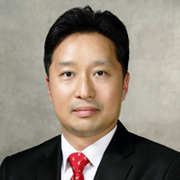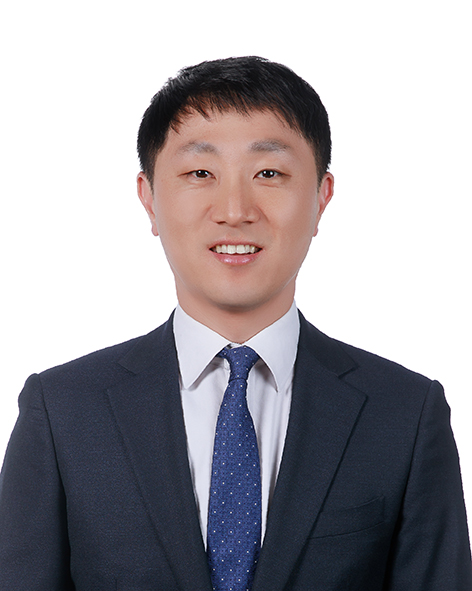Introduction1
The World Economic Forum cites climate change as one of five major global risks in the next decade.2 It is not surprising, therefore, that governments and intergovernmental agencies have been working to find solutions to this problem; the effort, however, has yet to bear much fruit. Part of the problem stems from a lack of sustained public interest.
This issue brief attempts to gauge South Korean public opinion on climate change by analyzing multiple survey data collected by the Asan Institute for Policy Studies. It is important to examine the public understanding of climate change because it influences their attitudes toward policies that will mitigate the impact of global warming. The Asan Annual Survey includes a limited number of questions on the environment, but the survey conducted in December 2019 includes an additional sub-module on climate change. Specifically, the survey includes questions about South Korean attitudes on climate change.
The Pew Research Center’s Global Attitudes Survey tracks public awareness and threat perceptions of climate change in 26 countries. The South Korean public consistently shows a high degree of awareness and concern about climate change in relation to people in other countries.3 Our most recent survey, however, shows that the South Korean public’s concern about climate change is lower than that of other traditional environmental problems, such as air pollution and waste management. The findings also indicate that the respondents tend to believe climate change is mainly caused by human use of fossil fuels (2.88). This sentiment was especially strong among the progressives and supporters of President Moon (2.98). We also found that there is broad recognition in South Korea about the seriousness of climate change (92.4%). This tendency, we found, is more pervasive among those who view climate change as being the result of human activities. Most importantly, we also found that the public attitudes about remedies for climate change are impacted by their views on this issue. For instance, the data indicates that a majority (66.6%) supports energy transition to mitigate problems associated with climate change. The South Korean public also expressed a willingness to tolerate a 19.2% point increase in their electricity bills to mitigate the effects of climate change. While the progressives (22.9%) and President Moon’s supporters (22%) are more likely to accept a higher increase in the electricity bills, conservatives (17.6%) and non-supporters of President Moon (16.3%) turn out to be more skeptical of it.
Public Views on Climate Change
Environmental Concern
Existing research suggests that there is a broad global consensus about the threat of climate change.4 However, the evidence also suggests that climate change is only one among many concerns that people have about other global risks. In this part of our analysis, we attempt to measure how the threat posed by climate change stacks up against other environmental concerns in South Korea.
To do this, we asked the respondents to rank order two most pressing environmental issues (“Which of the following are the most important environmental problems facing South Korea today? Please choose two in order of importance”, see Figure 1). The respondents chose air pollution (56.2%) followed by waste management (14.4%) and radioactive waste (10.1%) as the most pressing environmental problems. Less than 9% of the respondents stated that climate change was the most important environmental problem.
In the aggregate, the respondents expressed greatest concern regarding air pollution (72.7%) followed by waste management (36.3%), radioactive waste (26.8%), and climate change (25.6%). There are several explanations for why climate change is considered less pressing than other environmental problems. One possibility is that the result is influenced by response bias linked to the timing of our survey. In South Korea, winter months usually record the greatest concentration of PM2.5.5 A straightforward explanation is that climate change is less important when compared to other matters. Finally, there is the possibility that the public may be conflating climate change with one or more of these issues.
Figure 1. Most Important Environmental Problem6 (%)
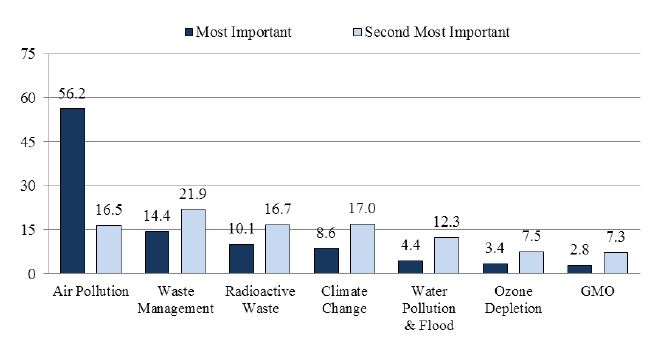
Evidence supports the last explanation (See Table 1). In fact, the data suggests that there is a correlation between air pollution and climate change. That is, 45.3% of those who chose climate change as the most important environmental problem chose air pollution as the second most important issue. 75.7% of those who mentioned climate change as the second most important environmental problem also stated that air pollution is the most pressing environmental problem facing South Korea. The finding shows that the respondents do not fully classify these two environmental problems as separate issues.
Table 1. Perceived Relationship between Air pollution and Climate Change7 (%)
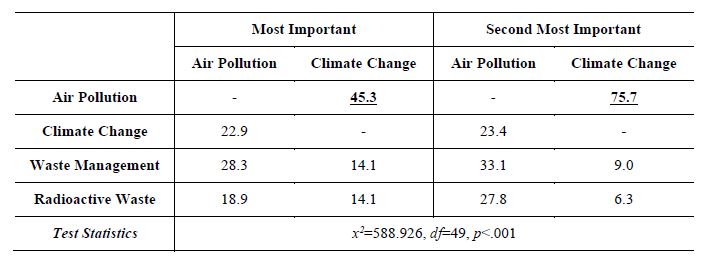
It is important to point out that we do not see a similar relationship among other issues, such as radioactive waste and waste management. What this suggests is that a significant percentage of the South Korean public who considers climate change as an important issue also considers air pollution to be an important issue. However, the data shows that an individual who considers air pollution to be an important environmental problem does not necessarily also think the same way about climate change.
Belief about Climate Change
In measuring South Korean attitudes about climate change, we asked the respondents how much trust they can lend to the following statement: “Scientists insist that climate change is mainly caused by the human use of fossil fuels. (1=Not trustful at all to 4=Very trustful)” The results indicate that the respondents tend to place a moderate amount of trust in the notion of anthropogenic causes of climate change (2.88). However, we find that the opinions are split along ideology and political orientation.8 Though the ideological gap is not large, the progressives are more likely to blame humans for climate change (2.98) than the moderates (2.85) or conservatives (2.77). Statistically speaking, the difference between moderates and conservatives in South Korea is not significant but the gaps between self-identified progressives and others are.
The respondent’s belief about climate change also differs according to his/her support for President Moon Jae-in. In particular, those who approve of President Moon are more likely to agree with the statement that humans are the root cause of climate change (2.98). Those who disapprove of President Moon are less committed to this view (2.78). The gap is statistically significant between ideologically divided respondents. This result resonates with the finding from the U.S. where party identification has been a consistent predictor of one’s view on climate change in general.9 A majority of Democrats, for instance, agree that climate change is mostly caused by human activities using fossil fuels. Republicans are much less inclined to agree.
Table 2. Belief about Climate Change 10(1=Not trustful at all, 4=Very trustful)

It is important to differentiate the role of ideology from presidential support when considering attitudes on the science of climate change because the progressives and moderates tend to hold a different view about this issue depending on their support for the president (See Table 1 in Appendix). That is, the moderates and progressives who disapprove of the president are 10%p less likely to trust the science of climate change. The data does not show this to be the case among conservatives.11
Seriousness about Climate Change
To track South Korean perception about the seriousness of climate change over time, the Asan Institute asked survey respondents the following question in 2014 and 2019: “How do you rate the seriousness of climate change? (1=Not serious at all to 4=Very serious).” Even though the percentage of respondents stating that climate change is a very serious environmental problem decreased from 50.6% in 2014 to 42.3% in 2019, there are more people (92.4%) acknowledging the seriousness of climate change in 2019 than in 2014 (86.1%).
Figure 2. Perceived Seriousness of Climate Change12 (%)
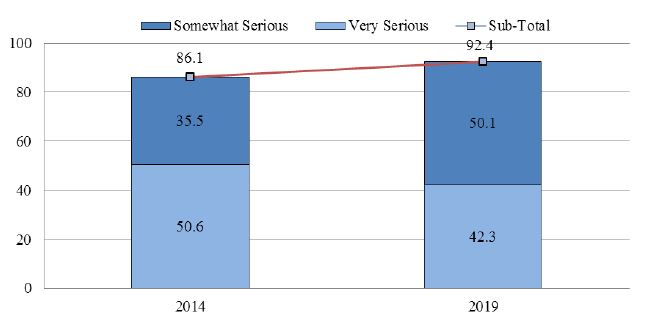
When comparing perception to the cause of climate change, we find that those who consider climate change to be a serious problem tend to agree with the view that humans are responsible for climate change. To be more precise, 98.6% of respondents who expressed a high degree of confidence about the cause of climate change being human use of fossil fuel also held that climate change is a serious environmental problem; 86.4% agreed that climate change is a very serious concern. This view is markedly different from those who are less confident about the connection between climate change and humans. For instance, 20.3% of those respondents expressing little confidence in the connection between climate change and human use of fossil fuels stated that climate change is not a serious concern. These findings support our view that the perceived seriousness of climate change is positively related to the extent to which an individual is informed about this issue.
Figure 3. Seriousness of Climate Change by Belief about Climate Change 13 (%)
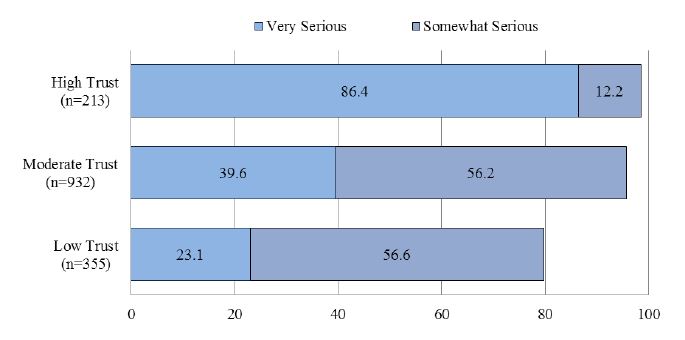
Environment vs. Economy
Priority between Environment and Economy
Climate change is often framed as a serious economic challenge. To see whether the respondents think climate change policy should be given priority even if it causes slower economic growth, we asked the respondents to answer, which is more important between the environment and economy.14 Overall, the respondents were evenly split with about half (51.7%) choosing the environment and half (48.3%) choosing the economy.
Educational attainment appears to be an important factor as more educated respondents tended to choose the environment over the economy. That is, more than half of postgraduates (61.7%) and college graduates (51.4%) prioritize the environment over the economy, while only 38.9% with less than high school education feel the same way. This is consistent with previous research conducted by the Pew Research Center in 2018.15 Ideology also seems to be an important intervening variable as 58.1% of progressives think that the environment is more important than the economy. Moderates or conservatives tend to prefer the economy over the environment (52.4% and 65.5%, respectively).
Figure 4. Environment vs. Economy 16 (in %)
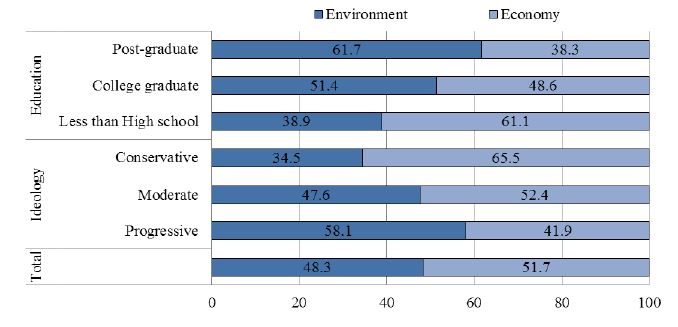
Resolving the Climate Crisis
One of the central challenges facing climate change is how this issue ought to be addressed. There appears, for instance, even a fundamental disagreement about who ought to take the lead in solving this problem. To see how the South Korean public thinks about this matter, we asked the following question: “Among which of following is the most responsible for resolving the problems of climate change?”
About half (48.8%) of the respondents answered the government ought to be most responsible for addressing this problem. Corporations were identified as the next most important player (24.9%); individuals came in at last (16.9%). We also found some interesting variations across the ideological spectrum. Conservative (51.4%) and moderate (50.2%) respondents tended to perceive a broader role for the government as opposed to the progressives (45.7%). Progressives tended to place greater weight on corporations and individuals than moderates and conservatives.
Political leanings also seem to be an important determinant. In particular, we found that there is a 10% point difference in views about whether the government or the corporations ought to be responsible for addressing the climate challenge. For instance, 44.2% of those who approve of President Moon claimed that the government ought to be the central player. 53.4% of those who disapproved of President Moon agreed with this view. Among those who favor President Moon, 29.4% believe that corporations ought to be more central in addressing the climate challenge. Only 20.3% of those who disapprove of President Moon think the same way.
Figure 5. Resolving the Climate Crisis 17 (%)
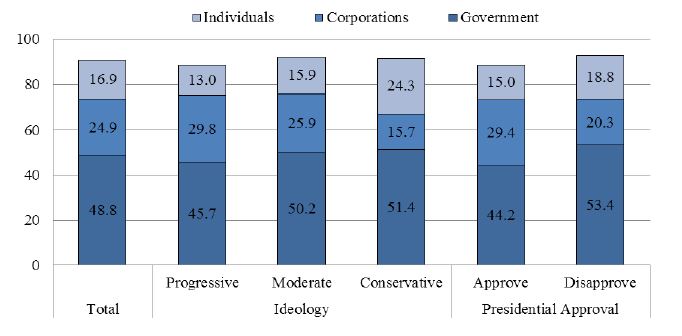
We also examine the public’s assessments about the competence of the government, corporations, and individuals in dealing with climate change. The data indicates that, overall, less than half (46.2%) of the respondents state that they are capable of resolving the climate crisis. 53.8% say they are not capable of doing so. Evaluation about the role of individuals (53.8%) exceeds that of government (48.4%) and corporations (37%). It appears that the respondents ultimately see individuals as the key to tackling the climate crisis.
Table 3. Capable of Resolving the Climate Crisis 18 (%)

Walking the Walk: Policy Options on Climate Change
Willingness to Pay
Reducing the consumption of fossil fuels and promoting renewable energy sources are often mentioned as public responses to the climate crisis. Such policies impose greater economic burdens on the public. In the long-term, economic costs and health risks are expected to increase. In order to gauge the South Korean public’s willingness to incur short-term costs to address climate change, we asked the respondents whether they will pay more for electricity to address climate change with a follow-up question about what percentage increase they are likely to tolerate. A majority (66.6%) stated that they are willing to incur higher electricity bills in order to fight climate change.
While respondents are generally supportive of policies to develop alternative energy sources, their willingness to pay differs based on ideological stance and political disposition. The progressives or supporters of President Moon are more likely to state that they are prepared to pay more to develop alternative energy sources. 77.1% express a willingness to pay for higher electricity bills, while the conservatives (55%) and those less supportive of President Moon (56%) are less willing to bear the burden of addressing climate change. We found that the progressives are 10% points more likely than conservatives and moderates to tolerate higher energy costs after accounting for their presidential support (See Table 2 in Appendix). 19
Figure 6. Willingness to Pay Higher Electricity Bills 20 (%)
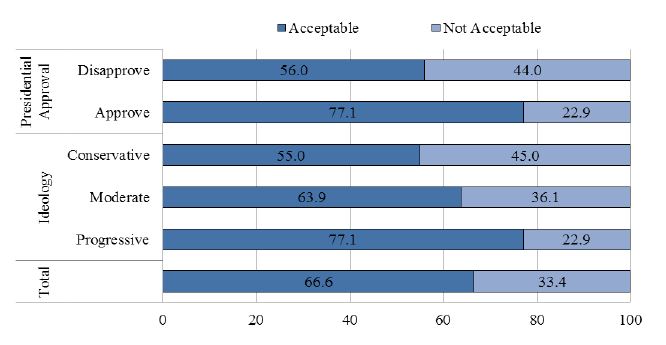
As a follow-up question, we asked “What percentages of increase in electricity bills are you willing to accept? Please indicate between 0 and 100%.” On average, the respondents expressed a willingness to accept a 19.2% point increase in their electricity bills. This finding suggests that the South Korean public may be willing to tolerate short-term economic costs in exchange for a meaningful energy transition.
Progressives (22.9%) and President Moon’s supporters (22%) are willing to accept a 22~23% point increase in their energy bills in order to address climate change. This is markedly higher than the level that other groups were willing to tolerate. The difference could be related to the respondents’ level of understanding of the climate crisis. Because the negative views about climate change are more widespread among left-leaning respondents, the progressives or supporters of President Moon may be more likely to tolerate higher costs. In contrast, the conservatives (17.6%) and non-supporters of President Moon (16.3%) tend to be less supportive of bearing the higher economic burden to address climate change. Our findings show that these subgroup differences are statistically significant (See Table 4).
Table 4. Acceptance to Level of Increase in Electricity Bills21 (%)

As expected, how the respondents view climate change aligns with their willingness to pay. Those who agree with the scientific explanation of climate change are willing to tolerate higher costs. The relationship is almost linear as the tolerance for higher costs is a function of perceived confidence about the existence of climate change. Those who hold a high level of confidence about climate change are also the ones most willing to accept an increase in their electricity bills (23.3% points). In contrast, the respondents with low trust are most skeptical of the increase in electricity bills (16.8% points). The respondents with a moderate level of trust say they are willing to accept a 19.1% point increase in their electricity bills. The F-test results indicate that the gaps between those that have high confidence as opposed to moderate/low confidence are statistically significant at p<0.05.
Table 5. Accept to Increase in Electricity Bills by Belief about Climate Change22 (%)

Conclusion
As climate change is likely to become a more significant environmental issue in the future, it is worth examining how the public perception of this issue changes over time. According to our data, the South Korean public tends to support the anthropogenic causes of climate change. We also noted that a supermajority (92.4%) of South Koreans view climate change as a serious problem. The data also indicates that there is a strong relationship between perceptions about the science of climate change and the seriousness of this problem globally (high trust 93.6% vs. low trust 79.7%). South Koreans also seem to think that government actions (48.8%) are more important than that of corporations (24.9%) and individuals (16.9%) when it comes to addressing the problem of climate change. Finally, two-thirds of the respondents (66.6%) also support the energy transition to tackle climate change.
We also found some interesting differences according to ideology and political disposition. For instance, the data shows that problem recognition is highest (2.98) among progressives or supporters of President Moon. This group also showed a greater tolerance for higher electricity bills (77.1%) to address the problem of global warming. For instance, left-leaning respondents showed a greater willingness to accept higher increase electricity bills (the progressives 22.9% points, President Moon’s supporters 22% points) compared to the conservatives (17.6% points) or non-supporters of President Moon (16.3% points), who expressed greater skepticism about the science of climate change.
The difference is significant since it signals a political challenge associated with implementing an effective policy solution on climate change. From a historical standpoint, the above gap is also significant since it was the conservative administration of President Lee Myung-bak that began implementing meaningful policies to mitigate the effect of climate change.
It is vital for the South Korean government to mobilize public support for climate change by heightening public awareness. In addition, more resources should be diverted to address the effects of climate change, such as an increase in air pollution, natural disasters, water and waste management, and biodiversity. If climate change and its relation to the energy economy are well-perceived by the public, energy transition essential to tackling climate change will also gain more support in South Korea.
Survey Methodology
Asan Poll
Sample Size: 1,000 respondents over the age of 19
Margin of Error: ±3.1% at the 95% confidence level
Survey Method: Random Digit Dialing (RDD) for mobile and landline phones
Period: See footnotes
Organization: Research & Research
Asan Annual Survey
Sample Size: 1,500 respondents over the age of 19
Margin of Error: ±2.5% at the 95% confidence level
Survey Method: Mixed-mode survey – Random Digit Dialing (RDD) for mobile and landline
phones using the online survey
Period: See footnotes
Organization: K-Stat Research
Appendix
Table 1. Belief about Climate Change by Presidential Approval with Controlling for Ideology (%)
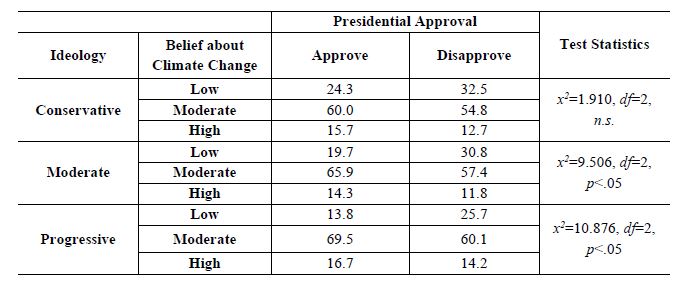
Table 2. Willingness to Pay by Presidential Approval with Controlling for Ideology (%)
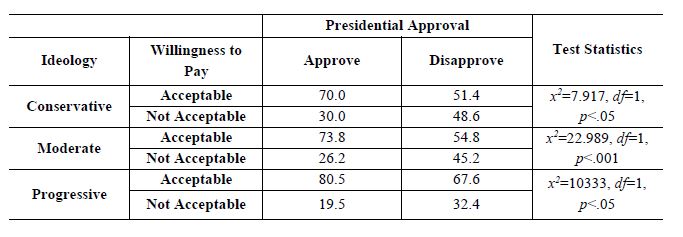
The views expressed herein do not necessarily reflect the views of the Asan Institute for Policy Studies.
- 1. Special thanks to Dr. Choi Kang, Dr. Park Jiyoung, and Ms. Yumi Ko for comments and suggestions on earlier versions of this paper.
- 2. World Economic Forum. The Global Risks Report 2020 (15th Edition). (https://www.weforum.org/reports/the-global-risks-report-2020).
- 3. Poushter, J. & Huang, C. (2019). Climate change still seen as the top global threat, but cyberattacks a rising concern. Pew Research Center. (https://www.pewresearch.org/global/2019/02/10/climate-change-still-seen-as-the-top-global-threat-but-cyberattacks-a-rising-concern/).
- 4. Ibid.
- 5. Source: KOSIS (Fine dust (PM2.5) statistics). (http://kosis.kr/statHtml/statHtml.do?orgId=106&tblId=DT_106N_03_0200145&conn_path=I2).
- 6. Source: Asan Annual Survey (December 4~24, 2019).
- 7. Source: Asan Annual Survey (December 4~24, 2019). To be succinct, Table 1 only includes the major results of cross-tabulations.
- 8. The relationship between ideology and presidential approval is statistically significant (x2=257.398, df=2, p<.001). As expected, the crosstab shows that the progressives are more likely to approve of President Moon (73.3%, disapprove 26.7%) and the conservatives tend to disapprove (80.7%, approve 19.3%). Self-identified moderates, however, are evenly split with 47.8% expressing approval of President Moon and 52.2% saying the opposite. Nevertheless, it is meaningful to conduct the analysis using those two variables. It is important to confirm that the difference between more politically divided groups is larger than those by the respondent’s ideology. Also, we can compare the difference between two extreme groups and the moderates.
- 9. Kennedy, B., & Hefferon, M. (2019). U.S. concern about climate change is rising, but mainly among Democrats. Pew Research Center. (https://www.pewresearch.org/fact-tank/2019/08/28/u-s-concern-about-climate-change-is-rising-but-mainly-among-democrats/).
- 10. Source: Asan Annual Survey (December 4~24, 2019).
- 11. Cross tabulated analysis yielded the following results: conservatives x2=1.910, df=2, n.s.; moderates x2=9.506, df=2, p<.05; progressives x2=10.876, df=2, p<.05.
- 12. Source: Asan Poll (August 4~6, 2014) Asan Annual Survey (December 4~24, 2019).
- 13. Source: Asan Annual Survey (December 4~24, 2019). Test Statistics: x2=301.571, df=4, p<.001.
- 14. Here follows the question and response options. “Which of following statements about environment and economy do you agree more with?” (1=Highest priority should be given to the environment, 2=Though both environment and economy are important, the environment comes first, 3= Though both environment and economy are important, the economy comes first, 4=Highest priority should be given to the economy). We aggregated the first two choices (1 to 2) as “environment” and the latter (3 to 4) two choices “economy.”
- 15. Fagan, M., & Huang, C. (2019). A look at how people around the world view climate change. Pew Research Center. (https://www.pewresearch.org/fact-tank/2019/04/18/a-look-at-how-people-around-the-world-view-climate-change/).
- 16. Source: Asan Annual Survey (December 4~24, 2019). Test Statistics: Ideology x2=49.003, df=2, p<.001; Education x2=30.549, df=2, p<.001.
- 17. Source: Asan Annual Survey (December 4~24, 2019). Test Statistics: Ideology x2=49.003, df=2, p<.001; Education x2=30.549, df=2, p<.001.
- 18. Source: Asan Annual Survey (December 4~24, 2019).
- 19. Cross-tabulated analysis yielded the following results: conservatives x2=7.917, df=1, p<.05; moderates x2=22.989, df=1, p<.001; progressives x2=10.333, df=1, p<.05.
- 20. Source: Asan Annual Survey (December 4~24, 2019). Test Statistics: Ideology x2=51.291, df=2, p<.001; Presidential approval x2=75.143, df=1, p<.001.
- 21. Source: Asan Annual Survey (December 4~24, 2019). The percentage increase in electricity bills the respondents can accept to address climate crisis differ from what they think about the increase itself (Test Statistics: t=-16.656, df=1407.200, p<.001). Those who accept the increase in electricity bills have a higher willingness to pay (24.4% points), whereas those in the opposite position have a lower willingness to pay (8.8% points).
- 22. Source: Asan Annual Survey (December 4~24, 2019). In contrast, the level of the respondents’ willingness to pay is not significantly different from the perceived seriousness of climate change. None of the multiple comparisons yield significant results.

 Facebook
Facebook Twitter
Twitter